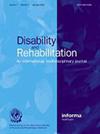Psychological factors of parental physical activity support among parents of children with disabilities: a meta-analysis.
IF 2.1
4区 医学
Q1 REHABILITATION
引用次数: 0
Abstract
PURPOSE Parents of children with disabilities often encounter challenges when supporting their child's physical activity (PA). Research on the psychological factors influencing parental support for PA has produced mixed results. The purpose of this meta-analysis was to a) synthesize psychological factors associated with parental support for PA, and b) evaluate the moderators of the association between parental support for PA and these psychological factors. METHODS Following PRISMA guidelines, this meta-analysis reviewed peer-reviewed English articles on parental support for children with disabilities (ages 0-18) from January 2009 to February 2022, with updates in February 2024. We searched six databases-PubMed, CINAHL, Academic Search Premier, SPORTDiscus, Scopus, and CENTRAL-and applied four statistical methods (Egger's regression, Duval and Tweedi's Trim and Fill, Classic Fail-safe N, and Begg's test) to assess study bias. RESULTS Twelve studies met the inclusion criteria, showing a medium association (r = .41, 95% CI [.28 - .50], p < .001) between parental PA support and psychological factors in parents of children with disabilities. Psychological constructs and child's age were not significant moderators. No publication biases were detected. CONCLUSION Limitations include the use of convenience samples and the lack of disability type as a moderator. Future research should address these gaps. Emphasizing parental intentions, parental PA, and self-efficacy can enhance parental support for PA in children with disabilities, promoting their PA engagement.残疾儿童家长支持体育锻炼的心理因素:一项荟萃分析。
目的残疾儿童的父母在支持孩子进行体育锻炼(PA)时经常会遇到困难。有关影响家长支持儿童体育锻炼的心理因素的研究结果不一。本荟萃分析的目的是:a)综合与父母支持残疾儿童体育锻炼相关的心理因素;b)评估父母支持残疾儿童体育锻炼与这些心理因素之间关系的调节因素。方法根据 PRISMA 指南,本荟萃分析回顾了 2009 年 1 月至 2022 年 2 月经同行评审的有关父母支持残疾儿童(0-18 岁)体育锻炼的英文文章,并在 2024 年 2 月进行了更新。我们检索了六个数据库--PubMed、CINAHL、Academic Search Premier、SPORTDiscus、Scopus 和 CENTRAL,并采用四种统计方法(Egger 回归法、Duval 和 Tweedi 的修剪和填充法、经典失效安全 N 和 Begg 检验)来评估研究偏倚。结果12项研究符合纳入标准,显示残疾儿童父母的 PA 支持与心理因素之间存在中等关联(r = .41,95% CI [.28 - .50],p < .001)。心理结构和儿童年龄不是重要的调节因素。结论:该研究的局限性包括使用了便利样本,以及缺乏将残疾类型作为调节因素。未来的研究应弥补这些不足。强调父母的意向、父母的 PA 和自我效能可以加强父母对残疾儿童 PA 的支持,促进他们参与 PA。
本文章由计算机程序翻译,如有差异,请以英文原文为准。
求助全文
约1分钟内获得全文
求助全文
来源期刊

Disability and Rehabilitation
医学-康复医学
CiteScore
5.00
自引率
9.10%
发文量
415
审稿时长
3-6 weeks
期刊介绍:
Disability and Rehabilitation along with Disability and Rehabilitation: Assistive Technology are international multidisciplinary journals which seek to encourage a better understanding of all aspects of disability and to promote rehabilitation science, practice and policy aspects of the rehabilitation process.
 求助内容:
求助内容: 应助结果提醒方式:
应助结果提醒方式:


